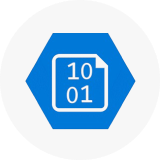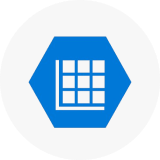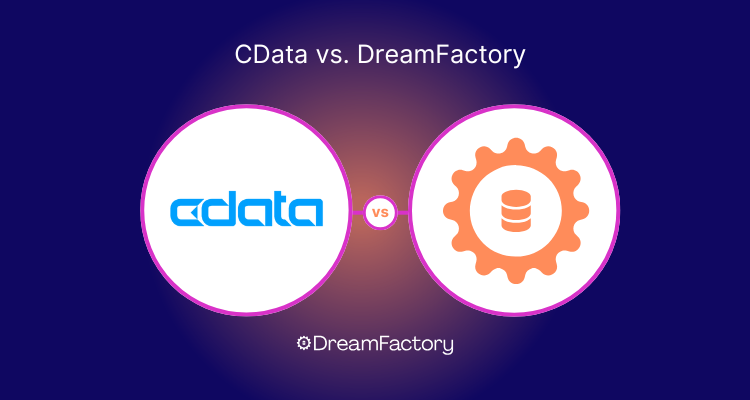This article compares CData and DreamFactory, two platforms for API generation and data integration. While both serve as tools for interfacing with data sources, they each offer distinct approaches to API management, deployment, as security considerations that are critical for organizations to understand.
Here are the key differences between CData and DreamFactory:
- Platform Scope and Integration: DreamFactory emphasizes an on-premise, customizable environment supporting an extensive variety of connectors, while CData focuses on cloud-based connectivity with simplified configuration.
- Security and Access Control: DreamFactory provides highly granular role-based access control (RBAC) and comprehensive security compliance options, contrasting with CData's standardized access control mechanisms.
- API Generation Flexibility: DreamFactory generates REST APIs instantly from data sources with additional customization and rate-limiting options. CData emphasizes real-time data connectivity through SQL access and standardized ODBC/JDBC connections.
- Architecture and Deployment Options: DreamFactory supports deployment in Docker and Kubernetes, making it suitable for complex, scalable environments. CData is often deployed in simpler cloud-based or desktop environments.
- Pricing Model: DreamFactory offers licensing tailored for enterprise-level scalability, while CData’s pricing is more suited to smaller to mid-sized deployments.
What Is CData?
Rating: 4/5 (G2)
CData offers connectivity solutions for real-time data access, enabling applications to interact with cloud and on-premise data sources using SQL-based connectivity. It supports a broad range of applications and services, from ODBC and JDBC connectors to SaaS data integration, focusing on making data integration more accessible for cloud, on-premises, and desktop applications.
What Is DreamFactory?
Rating: 4.4/5 (G2)
DreamFactory is an API generation and management platform designed for secure, scalable API creation directly from databases and other data sources. With support for hundreds of connectors and robust features like role-based access control, API rate limiting, and various authentication protocols, DreamFactory is widely used in industries with complex security and compliance needs such as healthcare and finance.
Comparison Overview
|
Feature |
CData |
DreamFactory |
|
API Generation |
Provides ODBC/JDBC connections and SQL-based connectivity |
REST API generation for hundreds of data sources with customizable options |
|
Access Control |
Standardized access control |
Granular role-based access control and user-specific settings |
|
Deployment Options |
Cloud-based and desktop installations |
Supports Docker and Kubernetes for scalable, on-premise, and cloud deployment |
|
Integration Scope |
Focuses on cloud data integration with pre-configured connectors |
Extensive integration options, including databases, files, and other API endpoints |
|
Pricing |
Tiered model suitable for SMBs and single deployments |
Enterprise-level pricing, with licensing tailored for scalable, multi-user environments |
CData vs. DreamFactory: Key Features
CData and DreamFactory each have distinctive capabilities suited to different use cases:
CData
- Real-Time Data Connectivity: CData emphasizes SQL-based connectivity, providing real-time data access across cloud and on-premises systems. This allows organizations to integrate with Microsoft SQL Server, Salesforce, and other data sources seamlessly, supporting live data retrieval and facilitating data-driven decisions with minimal latency.
- Integration Options: CData’s extensive support for ODBC, JDBC, and SaaS data connectors enables broad compatibility with systems such as Microsoft Dynamics, Salesforce, SQL Server,Amazon API Gateway, as well as NoSQL databases. By connecting to both legacy and modern data sources, CData offers a built-in way to unify data access and streamline cross-platform workflows.
- Configuration: With a simplified, no-code setup, CData is ideal for rapid integration and API development. This approach reduces implementation time, allowing business teams to quickly integrate with new systems and access essential data without extensive development work. For companies that need to quickly spin up data connectors, CData’s intuitive interface provides efficiency and ease of use, particularly in environments that prioritize rapid deployment over deep customization.
DreamFactory
- Comprehensive API Management: DreamFactory excels in API development by enabling automatic generation of REST APIs for databases such as SQL Server, MySQL, and even proprietary systems like Salesforce. Unlike CData, DreamFactory provides extensive customization options, allowing users to tailor APIs with built-in features like role-based access controls, virtual fields, and complex SQL-based data transformations directly within API calls.
- Security: DreamFactory offers robust, enterprise-grade security features, including role-based access control (RBAC), multi-factor authentication (MFA), Oauth, and adherence to industry standards for data protection. Its comprehensive security suite allows administrators to define and control API access for different roles and endpoints, making it highly suitable for organizations with strict security and compliance needs across finance, healthcare, and government sectors.
- Scalability: Designed with scalability in mind, DreamFactory is deployable within Docker and Kubernetes environments, facilitating load-balanced, distributed deployments across cloud or on-premises infrastructure. This flexibility, combined with support for Amazon API Gateway and integrations with other enterprise platforms, allows DreamFactory to scale with business growth, accommodating complex, multi-tenant environments and supporting a variety of business needs without compromising performance.
API Generation
API generation automates the creation of RESTful APIs from data sources, transforming data access into streamlined, no-code and low-code functionality. By generating APIs automatically, platforms can enable users to integrate complex data management tasks and workflows without manual coding, improving ease of use across varied applications. This automation allows businesses to efficiently expose and utilize their data, facilitating seamless data flow between systems and supporting faster, more scalable application development and integration.
Both platforms support data access but employ different methodologies to deliver API services.
CData
- Focuses on data connectivity through ODBC and JDBC, ideal for data retrieval across multiple sources in real time.
DreamFactory
- Enables REST API generation with customization options, supports virtual fields, rate limiting, and SQL-based data transformations, suitable for enterprises that need a centralized, secure API layer.
Deployment Options
While both platforms can be used in cloud and on-premise environments, DreamFactory offers more flexible and scalable deployment options.
CData
- Primarily cloud and desktop-based, suited for small to medium-sized setups.
DreamFactory
- Supports Docker and Kubernetes, facilitating horizontally scalable deployments, ideal for complex enterprise environments.
Pricing
Both CData and DreamFactory offer tiered pricing, but with differing emphases.
CData
- Generally more accessible for small to mid-sized businesses, focusing on single-use deployment licenses.
DreamFactory
- Targets enterprise needs, offering customizable licensing that scales with larger deployments and multi-user environments.
CData vs. DreamFactory vs. DreamFactory: Which Is Best for You?
The best choice depends on your organization’s unique needs:
- CData is ideal for companies needing fast SQL-based data connectivity with minimal setup.
- DreamFactory is optimal for enterprises requiring secure, customizable API management and robust deployment in Docker and Kubernetes.
Getting Started with DreamFactory
For enterprises, API generation is key to unlocking data access across systems like SQL Server, Salesforce, Oracle, Snowflake and more, without custom development. DreamFactory automates this process, generating secure, ready-to-use REST APIs directly from data sources in minutes. With built-in features like role-based access control (RBAC), multi-factor authentication, permissions, and rate limiting, DreamFactory offers enterprise-grade data security and scalability. Its Docker and Kubernetes deployment support makes it ideal for complex, distributed environments, integrating easily with services like Amazon API Gateway.
Schedule a demo to see DreamFactory’s unique API generation and management capabilities in action.
FAQs
What types of data sources can DreamFactory and CData connect to?
DreamFactory supports a wide range of data sources, including databases like SQL Server, MySQL, PostgreSQL, and NoSQL options like MongoDB, as well as enterprise platforms like Salesforce and Amazon S3. CData primarily focuses on SQL-based connections, offering ODBC and JDBC drivers for applications such as Microsoft Dynamics, Salesforce, and SQL Server.
How does DreamFactory’s API generation process work?
DreamFactory automatically generates RESTful APIs from connected data sources without requiring code. Once a data source is connected, DreamFactory creates secure, customizable API endpoints that are ready for use in application development and data integration workflows.
Is DreamFactory suitable for high-security industries?
Yes, DreamFactory is built with security in mind, offering features like role-based access control (RBAC), multi-factor authentication, and compliance with key security standards. This makes it highly suitable for industries requiring strict data governance, including healthcare, finance, and government.
Can both platforms handle on-premises and cloud deployments?
Yes, both DreamFactory and CData can be deployed in cloud and on-premises environments. DreamFactory additionally supports Docker and Kubernetes, allowing for horizontally scalable, enterprise-grade deployments across hybrid architectures.
How does pricing compare between DreamFactory and CData?
CData typically offers pricing suited to smaller setups and single-use deployments, ideal for mid-sized businesses. DreamFactory provides enterprise licensing options, optimized for larger, multi-user environments with extensive API management and security needs.
As a seasoned content moderator with a keen eye for detail and a passion for upholding the highest standards of quality and integrity in all of their work, Spencer Nguyen brings a professional yet empathetic approach to every task.
























 Blog
Blog


